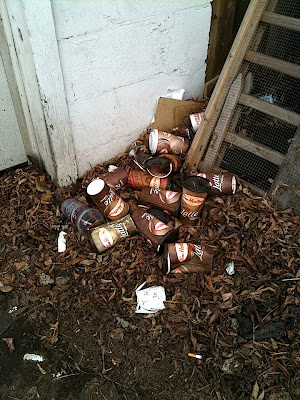Photo property of Tanya Day Ritchie,
Ward 3 Residents' Association, facebook
How do you feel when walking down sidewalks that are littered, through open spaces that have debris scattered, along streetscapes that seem little more than receptacles for castaway this and that?
How does it make you feel about the place?
What images does the experience bring to mind? What kinds of thoughts are connected by way of all the... All the crap?
Most people, if they take notice of it at all, probably shiver in disgust, sniff their judgement, register a negative vote.
Now, as to the converse: cleanliness, uncluttered, spotless...?
Chances are, not much registers at all. Save for a sense of rightness.
Just as surely as we define our environments, we're defined by them.
Lately, I've had conversations on different fronts, written emails and private blog entries focusing on how our streets look, how our neighbourhoods look, littering, the dumping of 'junk' en masse...what can be inferred from all this regarding respect, pride-of-place, community participation...as well as how our general societal construct has both informed and been informed by all of the above.
I've come to believe that I take a slightly different tack from some.
Because I don't see treating the symptom as being the best approach. Not even the wisest one. That the prevalence of littering is determined so strongly by our sense of community, and because I see 'community building' as being part of a much bigger, much broader, much more complicated effort, so is addressing littering.
Last autumn, I wrote a three-part editorial here regarding voter turnout. I took the stance that we shouldn't be asking 'Why don't people vote?', but rather 'Why do people vote?' And I think that as part of addressing litter, rubbish and trash, we need to take a similar approach. Because to me, the goal isn't to 'stop people littering', it's discovering and examining why so many people wouldn't in a kajillion years behave this way. But first, it still might help to examine why we have the 3-D version of graffiti.
People litter because they don't care. And it's become their habit to not care. They don't care to 'own' their litter and dispose of it properly. They don't care to carry it to the nearest bin. They litter because of anger and frustration at their lot, at their lives, and it's their way of (albeit, unconsciously) giving the finger to the world that's clearly so against them. They litter because they're not connected to their street, their neighbourhood, their community, their city. These seemingly have no meaning, no value in their lives...or at least insufficient amounts of meaning or value to get them to act differently. They litter because of a sense of entitlement, entitlement to do whateverthefucktheywant...even if it's in so small-minded and mealy-mouthed a way. They litter because it's an expression of power and control in lives where they feel powerless and not in control. It is, at its roots, a lazy approach to walking through the world as are bigotry and a general lack of humanity. It's about as evolved as pulling the wings off flies, setting ants on fire or shoving firecrackers into frogs. Yeah, it's societally juvenile...and it's delinquent of just about everything we believe in as Canadians.
So I guess that, going back to my paradigm about 'Why do people vote?', the question 'Why don't people litter?'
Now, beyond the obvious 'They know in their hearts that it's wrong', it's safe to say that they're possessed of more respect for the world they walk through, they're not needing to 'lash out' at Life by horking a big loogie, handtrash-wise, they care about where are and the impact they have...and they have better manners, because they know that to litter is rude.
To be continued...


Your comment about 3-d graffiti is a little disturbing and biased. Other then that a neat perspective.
ReplyDelete'Biased'? Perhaps. In the sense of this being a 'societal bias'.
ReplyDelete'Disturbing'? Only if your bias is of the opposite inclination.
Some years back, I wrote a short screenplay addressing the notion of 'ultimate personal responsibility' concerning graffiti. It's especially relevant today.
Email me and I'll share it with you.